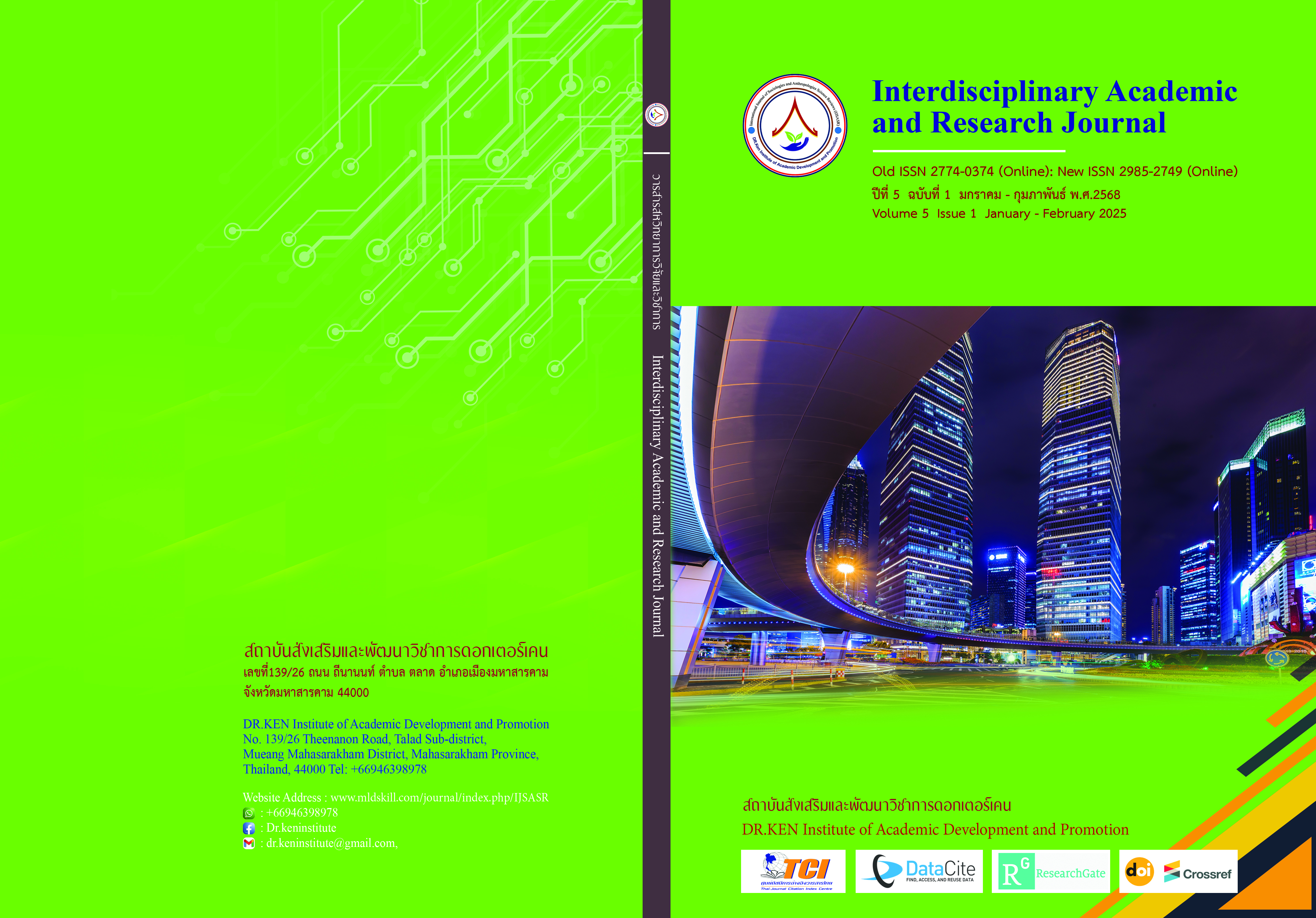Development Guidebook for The Life Quality of Elderly Promotion Based on the Sufficiency Economy Philosophy through the Community
DOI:
https://doi.org/10.60027/iarj.2025.279762Keywords:
Guidebook, The life quality of elderly, Philosophy of sufficiency economyAbstract
Background and Aims: At present, the global community, including Thailand, has transitioned into an aging society, which impacts national development. The objectives are 1) to study the current condition, problems and needs related to the promotion of the life quality of elderly according to the Sufficiency Economy Philosophy through the community 2) To develop a guidebook to promote the life quality of elderly according to the Sufficiency Economy Philosophy through the community and to assess the appropriateness of the guidebook to promote the life quality of elderly according to the sufficiency economy philosophy through the community.
Methodology: The research employs a mixed-method approach with the following stages: Stage 1: Document review and current situation analysis. This involves gathering relevant documents and studying the current conditions, problems, and needs related to promoting the quality of life for older adults. A structured questionnaire is used to survey a sample of 400 participants aged 60 and above, residing in Samut Prakan province. Stage 2: Drafting the manual outline. The content framework is established, comprising five aspects based on the Sufficiency Economy Philosophy. Stage 3: Evaluating the manual's suitability. The draft manual is presented to 6 purposively selected Village Health Volunteers (VHVs) and 60 purposively selected older adult representatives from Samut Prakan province. A questionnaire is used to assess the manual's appropriateness. Stage 4: Creating a comprehensive manual containing essential information on improving the quality of life for the elderly based on the Sufficiency Economy Philosophy.
Results: The results showed that the life quality of elderly in Samut Prakan Province according to the Sufficiency Economy Philosophy Overall, it was at a high level (\overline{x}=3.99) and there was a need for the life quality of elderly improvement according to the Sufficiency Economy Philosophy through the community in Samut Prakan Province. It was found that the elderly wants community leaders to promote income and expense accounting, find an additional career, take care of health thoroughly both physical and mental health and promote savings. The developed guidebook takes the form of a brochure, comprising a cover page, rationale, objectives, concepts, implementation methods, and expected outcomes. Its content encompasses five key components, including the three rings and two conditions of the Sufficiency Economy Philosophy. As for the assessment of the appropriateness level of the guidebook to promote the life quality of elderly according to the Sufficiency Economy Philosophy through the community by the Village Health Volunteers representatives (VHVs) overall were at a moderate level (\overline{x}=3.44) and assessed the appropriateness level of this guidebook by the elderly representatives overall was at a moderate level (\overline{x}=3.50).
Conclusion: The findings of this research demonstrate that in developing a guidebook to promote the quality of life for elderly based on the Sufficiency Economy Philosophy through the Community, it is essential to begin by surveying the current issues and development needs of the elderly. This ensures that the guidebook aligns as closely as possible with the community context and the specific requirements of the elderly. The practical methods outlined in the guidebook are designed to enable the elderly to live in accordance with the principles of the Sufficiency Economy. When the appropriateness of the developed guidebook was evaluated by relevant stakeholders, it was found to have an overall moderate level of suitability, indicating its potential for further implementation.
References
กรมกิจการผู้สูงอายุ กระทรวงการพัฒนาสังคมและความมั่นคงของมนุษย์. (2562). มาตรการขับเคลื่อนระเบียบวาระแห่งชาติ เรื่อง สังคมสูงอายุ (ฉบับปรับปรุง). กรุงเทพ ฯ : บริษัทอมรินทร์พริ้นติ้งแอนด์พับลิชชิ่ง จำกัด (มหาชน).
กอปรกมล ศรีภิรมย์ และปาลีรัตน์ วงศ์ฤทธิ์. (2561). นโยบายการพัฒนาคุณภาพชีวิตของผู้สูงอายุในกลุ่มประเทศอาเซียนต่อผลลัพธ์การดูแลผู้สูงอายุในเขตเมือง. วารสารเอเชียพิจาร ศูนย์การศึกษาเอเชีย คณะรัฐศาสตร์ มหาวิทยาลัยรามคำแหง, 5 (9), 107-143.
กันตยา มานะกุล. (2550). การพัฒนาคุณภาพชีวิตโดยยึดปรัชญาเศรษฐกิจพอเพียง: กรณีศึกษาชุมชนบ้านจอมจันทร์ หมู่ที่ 2 ตำบลสันทราย อำเภอแม่จัน จังหวัดเชียงราย. ปริญญานิพนธ์การศึกษาดุษฎีบัณฑิต สาขาวิชาการศึกษาผู้ใหญ่ บัณฑิตวิทยาลัย : มหาวิทยาลัยศรีนครินทรวิโรฒ.
เจษฎา นกน้อย และวรรณภรณ์ บริพันธ์. (2560). คุณภาพชีวิตของผู้สูงอายุในจังหวัดสงขลา. วารสารมหาวิทยาลัยนราธิวาสราชนครินทร์, 9(3), 94-105.
ชล บุนนาคและภูษณิศา กมลนรเทพ. (2563). ความสัมพันธ์ระหว่างปรัชญาของเศรษฐกิจพอเพียง (Sufficiency Economy Philosophy: SEP) และเป้าหมายการพัฒนาที่ยั่งยืน (Sustainable Development Goals: SDGs). Retrieved on 20 July 2024 from: https://www.sdgmove.com/2019/09/27/sep-and-sdgs/
ณัฏยาณี บุญทองคำ และพระครูปลัดสุวัฒนพุทธิคุณ (สุเทพ ดีเยี่ยม). (2563). คุณภาพชีวิตที่ดีตามหลักปรัชญาเศรษฐกิจพอเพียงภายใต้ภาวะโรคระบาด “โควิด-19”. วารสารการบริหารนิติบุคคลและนวัตกรรมท้องถิ่น, 6 (4), 235-246.
ณิชาภา เจริญรุ่งเรืองชัย. (2547). คู่มือการบริหารงานโครงการอาหารกลางวันในโรงเรียนดอนฉิมพลีพิทยาคม. สารนิพนธ์การศึกษามหาบัณฑิต (การบริหารการศึกษา). กรุงเทพฯ: บัณฑิตวิทยาลัย มหาวิทยาลัยศรี - นครินทร์วิโรฒ.
นัสมล บุตรวิเศษ และอุปริฏฐา อินทรสาด. (2564). ปัจจัยที่ส่งผลต่อคุณภาพชีวิตของผู้สูงอายุ: กรณีศึกษาอำเภอพระนครศรีอยุธยา จังหวัดพระนครศรีอยุธยา. รายงานการวิจัย มหาวิทยาลัยเทคโนโลยีราชมงคลสุวรรณภูมิ.
นุดี รุ่งสว่าง. (2543). การพัฒนาคู่มือการสร้างหลักสูตรระดับโรงเรียนสำหรับครูประถมศึกษา. วิทยานิพนธ์ปริญญาศึกษาศาสตรมหาบัณฑิต (สาขาวิชาหลักสูตรและการนิเทศ). นครปฐม: บัณฑิตวิทยาลัย มหาวิทยาลัยศิลปากร.
พระครูปลัดสุวัฒนพุทธิคุณ (สุเทพ ดีเยี่ยม) (2563). ภาวะผู้นำทางการเมืองเชิงพุทธเพื่อการบริหารกิจการบ้านเมืองที่ดี. วารสารวิจยวิชาการ, 5(2), 263–274. https://doi.org/10.14456/jra.2022.48
พัชรินทร์ จันทร์แจ้ง. (2559). การพัฒนาคู่มือการเบิกจ่ายค่าใช้จ่ายในการจัดโครงการบริการวิชาการของมหาวิทยาลัยราชภัฏนครปฐม. รายงานการวิจัย มหาวิทยาลัยราชภัฏนครปฐม.
มูลนิธิชัยพัฒนา. (2567). เศรษฐกิจพอเพียง. Retrieved on 5 July 2024 from: https://www.chaipat.or.th/publication/publish-document/sufficiency-economy.html
เวธกา กลิ่นวิชิตและพิสิษฐ์ พิริยาพรรณ. (2563). การวิจัยเชิงปฏิบัติการแบบมีส่วนร่วมของชุมชนในการพัฒนาคุณภาพชีวิตแบบพอเพียงของผู้สูงวัยไทยในภาคตะวันออก. วารสารวิชาการ ปขมท., 9 (1), 80 – 93.
สำนักงานคณะกรรมการพัฒนาการเศรษฐกิจและสังคมแห่งชาติ. (2550). แผนพัฒนาเศรษฐกิจและสังคมแห่งชาติฉบับที่ 10. กรุงเทพฯ : สำนักงานคณะกรรมการพัฒนาเศรษฐกิจและสังคมแห่งชาติ.
สำนักงานพัฒนาสังคมและความมั่นคงของมนุษย์จังหวัดสมุทรปราการ. (2564). รายงานสถานการณ์ทางสังคมจังหวัดสมุทรปราการ. Retrieved on 5 July 2024 from: www.sumutprakan.m.society.go.th
Gunawan, I., Lin, M-H, & Hsu, H-C. (2020). Exploring the quality of life and its related factors among the elderly. South East Asia Nursing Research, 2 (1), 1-10.
Hidayati, A. R., Gondodiputro, S. & Rahmiati, L. (2018). Elderly Profile of Quality of Life Using WHOQOL-BREF Indonesian Version: A Community-Dwelling. Althea Medical Journal, 5 (2), 105-110.
Downloads
Published
How to Cite
Issue
Section
License
Copyright (c) 2025 Interdisciplinary Academic and Research Journal

This work is licensed under a Creative Commons Attribution-NonCommercial-NoDerivatives 4.0 International License.
Copyright on any article in the Interdisciplinary Academic and Research Journal is retained by the author(s) under the under the Creative Commons Attribution-NonCommercial-NoDerivatives 4.0 International License. Permission to use text, content, images, etc. of publication. Any user to read, download, copy, distribute, print, search, or link to the full texts of articles, crawl them for indexing, pass them as data to software, or use them for any other lawful purpose. But do not use it for commercial use or with the intent to benefit any business.
















.png)


